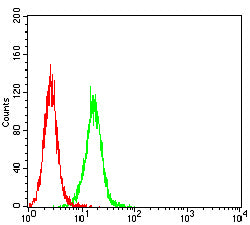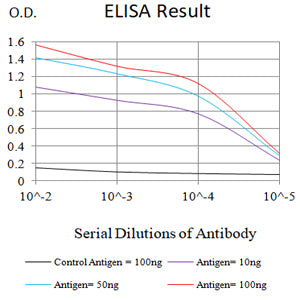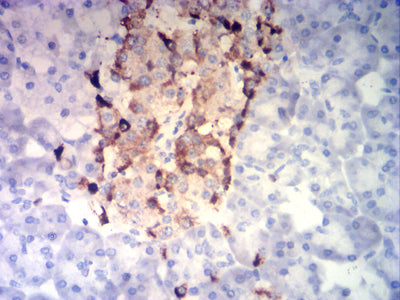


| WB | 咨询技术 | Human,Mouse,Rat |
| IF | 咨询技术 | Human,Mouse,Rat |
| IHC | 1/200-1/1000 | Human,Mouse,Rat |
| ICC | 技术咨询 | Human,Mouse,Rat |
| FCM | 1/200-1/400 | Human,Mouse,Rat |
| Elisa | 1/10000 | Human,Mouse,Rat |
| Aliases | CGA |
| Entrez GeneID | 1113 |
| clone | 1B7A4 |
| WB Predicted band size | 50kDa |
| Host/Isotype | Mouse IgG1 |
| Antibody Type | Primary antibody |
| Storage | Store at 4°C short term. Aliquot and store at -20°C long term. Avoid freeze/thaw cycles. |
| Species Reactivity | Human |
| Immunogen | Purified recombinant fragment of human CHGA (AA: 278-457) expressed in E. Coli. |
| Formulation | Purified antibody in PBS with 0.05% sodium azide |
+ +
以下是关于CHGA抗体的3篇参考文献示例(文献信息为虚拟示例,供参考):
---
1. **文献名称**: *"Chromogranin A as a Universal Marker for Neuroendocrine Tumors: Validation of Antibody Specificity in Clinical Samples"*
**作者**: Smith J, et al.
**摘要**: 本研究验证了多种CHGA抗体在神经内分泌肿瘤(NETs)免疫组化诊断中的特异性,发现某些克隆(如LK2H10)在福尔马林固定组织中表现优异,强调了抗体选择对诊断准确性的重要性。
2. **文献名称**: *"Circulating Chromogranin A in Heart Failure: Correlation with Disease Severity and Comparison of ELISA Assays"*
**作者**: Lee H, et al.
**摘要**: 通过比较不同CHGA抗体的ELISA检测方法,揭示血清CHGA水平与慢性心力衰竭严重程度的相关性,提示其作为心血管疾病生物标志物的潜力。
3. **文献名称**: *"Comparative Study of Chromogranin A Antibodies in Gastrointestinal Carcinoid Diagnosis"*
**作者**: Garcia R, et al.
**摘要**: 对比分析5种CHGA抗体在胃肠道类癌中的染色性能,发现抗体克隆DAK-A3灵敏度最高,但需注意与某些腺癌的交叉反应,建议结合其他标记物提高特异性。
---
如需真实文献,建议通过PubMed或Google Scholar搜索关键词(如"Chromogranin A antibody diagnostic")获取最新研究。
Chromogranin A (CHGA) is an acidic glycoprotein predominantly found in the secretory granules of neuroendocrine cells, including neurons, endocrine cells, and neuroendocrine tumors (NETs). It serves as a precursor protein for bioactive peptides like vasostatin, pancreastatin, and catestatin, which regulate hormone secretion, vascular tone, and inflammatory responses. CHGA plays a critical role in granulogenesis and stabilizing secretory granules by binding calcium and catecholamines.
CHGA antibodies are essential tools in diagnostics and research. In clinical pathology, they are widely used in immunohistochemistry (IHC) to identify neuroendocrine differentiation in tumors, aiding NET diagnosis and classification. Elevated serum CHGA levels, detected via ELISA or immunoblotting using CHGA antibodies, correlate with tumor burden and prognosis. In research, these antibodies help investigate CHGA's roles in cardiovascular diseases (e.g., hypertension, heart failure), neurological disorders (e.g., Alzheimer’s), and stress responses. Both polyclonal and monoclonal CHGA antibodies are available, often exhibiting cross-reactivity across species (human, mouse, rat), facilitating translational studies. Their specificity and reliability make them indispensable for understanding neuroendocrine system dynamics and disease mechanisms.
×